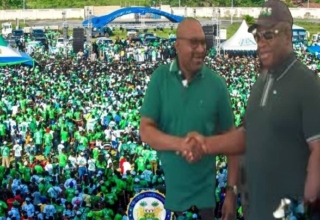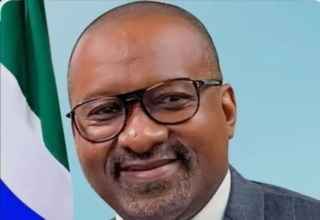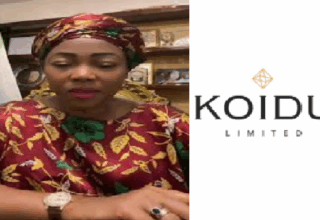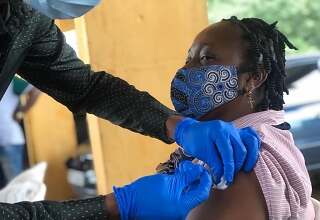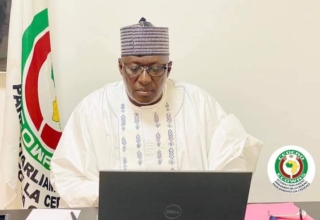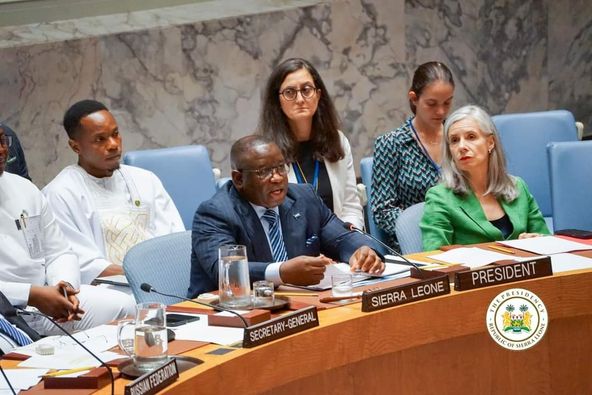
STATEMENT BY PRESIDENT BIO AT THE UNITED NATIONS SECURITY COUNCIL DEBATE ON THE MAINTENANCE OF INTERNATIONAL PEACE AND SECURITY: ADDRESSING THE HISTORICAL INJUSTICE AND ENHANCING AFRICA’S EFFECTIVE REPRESENTATION IN THE UN SECURITY COUNCIL, UNSC CHAMBER, UN HQ – 12TH AUGUST 2024
Distinguished Members of the Security Council, Excellencies, Heads of State and Government, Distinguished Representatives, Ladies and Gentlemen,
I am honoured to address the United Nations (UN) Security Council with a profound sense of purpose and urgency on a matter of grave importance — the maintenance of international peace and security – through the reform of the UN Security Council.
Today, I will specifically focus on addressing the historical injustice and enhancing Africa’s effective representation in the Council
I thank the UN Secretary-General, His Excellency António Guterres, the President of the 78th Session of the UN General Assembly, His Excellency Denis Francis, and Dr Sithembele Mbete for their very insightful and thought-provoking briefings.
I wholeheartedly welcome the participation of the African Union Committee of Ten Heads of State and Government on UN Security Council Reform (C-10) and their representatives in this meeting.
I also welcome the participation of representatives of Member States and Interest Groups engaged in the Intergovernmental Negotiations (IGN) at the UN General Assembly, including the Co-Chairs, the Permanent Representatives of Austria and Kuwait, respectively.
I thank them for their important work and the urgency with which they are carrying out their mandate under the leadership of the President of the General Assembly.
Today, I speak as a representative of a Continent that has long been under-represented in the decision-making processes that shape our world on matters of peace and security.
It is now a settled view that the UN Security Council needs reforming. The imperative for reform is irrefutable. Nearly 80 years after its creation, the Council has been stuck in time.
Its imbalanced composition is at odds with current realities and unjust, undermining its legitimacy and effectiveness.
Africa remains the unquestionable victim. With the absence of structural change, the Security Council’s performance and legitimacy remain questionable.
Accordingly, as we reflect on this debate’s theme and profound implications, it is essential to recognise how the historical injustice has significantly hindered Africa’s ability to contribute effectively to global governance.
The legacy of colonialism, economic exploitation, and political marginalisation has left deep scars on the Continent, affecting its development, stability, and influence in international affairs.
The UN, the cornerstone of international cooperation, was founded on principles of equality, justice, and the collective pursuit of peace.
Yet, the current structure of the Security Council reflects an outdated world order, an era that fails to recognise Africa’s growing importance and contributions.
Despite being home to over 1.3 billion people, and the 54 African countries making up 28 percent of the total membership of the UN, with significant contributions to peacekeeping and conflict resolution, Africa remains grossly underrepresented in this vital organ of the UN.
This underrepresentation statistics; it is a profound addressed.is not merely an anomaly of historical injustice that must be
As a consequence, and under the leadership of the C-10, Africa has been steadfast in its commitment to rectifying this injustice and imbalance of the UN Security Council.
As the Coordinator of the C-10, Sierra Leone has spearheaded efforts to amplify Africa’s voice on this issue.
Through the Common African Position as espoused in the Ezulwini Consensus and the Sirte Declaration, Africa has articulated a clear and compelling vision and model for reform, one that ensures equitable representation and meaningful participation of Africa in the Counc
Africa demands two permanent seats in the UN Security Council and two additional non-permanent seats, bringing the total number of non-permanent seats to five. The African Union will choose the African Permanent Members.
Africa wants the veto abolished. However, if UN Member States wish to retain the veto, it must be extended to all new Permanent Members as a matter of justice.
The Common African Position is premised on the fact that by rectifying the historical injustice, the international community will not only promote greater fairness, equity and equality in global governance, but also act on the imperative to ensure the legitimacy and effectiveness of the Council itself.
It will further unlock Africa’s full potential as a dynamic and vibrant Continent capable of meaningfully contributing to the advancement of peace, security, and stability worldwide.
Africa’s experiences and perspectives remain invaluable in shaping comprehensive and effective solutions to global challenges.
We, therefore, welcome the general convergence that has emerged from the IGN, as reflected in the Co-Chairs’ Elements Paper thus: “There is a wider recognition and broader support by Member States for the legitimate aspiration of the African countries to play their rightful role on the global stage, including through an increased presence in the Security Council, as reflected in the Ezulwini Consensus and the Sirte Declaration adopted by the African Union in 2005. Redressing the historical injustice against Africa is viewed as a priority, and several delegations emphasised that Africa should be treated as a special case”.
EXCELLENCIES,
To fully understand the need to address the injustice being done to Africa, let me briefly underscore the compelling historical foundations.
From the arbitrary partition of Africa, during and after the colonial period, African nations were excluded from key international decisions that affected their future.
The lack of sovereignty and political representation during those periods has had lasting effects on Africa’s ability to shape global policies and institutions.
This historical injustice stems from colonial legacies and power imbalances that persist to this day. The legacy of slavery intersects with other forms of historical injustice, including colonialism, imperialism, and exploitation.
Africa has long been marginalised in global decision-making processes, and its voices are often drowned out. This results in a lack of meaningful representation on issues that directly affect the Continent, such as conflict prevention, peacekeeping operations, conflict resolution, and sustainable development.
This systemic bias perpetuates a cycle of marginalisation and reinforces the false notion of Africa as a passive actor in shaping global affairs.
Furthermore, the political marginalisation experienced during colonial rule has contributed to ongoing struggles for stable governance and political cohesion within the African States, further complicating their ability to engage robustly on the global stage.
Therefore, the current architecture of international institutions, including the UN Security Council, as noted, reflects the geopolitical realities of the post-World War II era, which largely excluded African voices.
This paradigm of non-representation and/or underrepresentation means that Africa’s perspectives and priorities are regrettably overlooked in global decision-making processes.
The absence of permanent African representation in the Security Council means that decisions impacting the Continent are made without sufficient African input, leading to policies that may not align with the needs and aspirations of African nations.
This Council is all too familiar with situations where African mediation and conflict resolution efforts were disregarded for interventions that have had and continue to have disastrous consequences in the Continent.
In view of the preceding, effective representation of Africa in the Security Council is imperative for several reasons.
First and foremost, for the very legitimacy of the Council. Already the Security Council’s imbalance composition and unjust exclusion of Africa in the permanent category and underrepresentation in the non-permanent category of membership undermines its current legitimacy.
The unjust composition also adversely impacts the Council’s effectiveness.
It has been robustly argued that the performance of institutions like the Security Council declines as its perceived legitimacy diminishes and that international legitimacy depends on inclusivity and fairness.
Therefore, to strengthen the Security Council, the historical injustice against Africa must be rectified as a matter of priority.
Second, the importance of upholding equity and justice, particularly for equitable decision-making, cannot be overstated.
The historical injustice against Africa contradicts the UN’s principles of justice, equity and democratic representation.
As the Council Members know too well, these principles directly impact the Council’s work. Accordingly, Africa’s inclusion in the permanent membership category will ensure that decisions affecting the Continent are made with direct and meaningful input from those most impacted.
Third, to reflect present-day global and geopolitical realities. The geopolitical landscape has significantly evolved since 1945.
Africa’s growing economic, political, and social influence necessitates its representation in key international forums, including, but not limited to, the UN Security Council
Given Africa’s population, number of Member States, political significance, and contributions to international peace and security, the UN’s immediate corrective action is crucial.
Fourth, the effective maintenance of international peace and security. It is noteworthy that more than 60 percent of the Council’s deliberations, decisions, and peacekeeping missions are concentrated in or affect Africa.
An enhanced African presence will provide invaluable insights and perspectives that will foster ownership, informed and effective decision-making, and interventions.
Africa’s demand for reform is addressing the Continent’s aspirations. rooted in unique the imperative of challenges and aspirations.
African leadership and solutions are crucial for addressing African challenges. From persistent to emerging conflicts, terrorism, famine, and humanitarian crises, Africa faces a myriad of complex issues that necessitate global cooperation and solidarity with African leadership.
The question that now comes to mind is how can we address the historical injustice and enhance Africa’s representation?
I strongly believe that the following steps are necessary and can even be considered imperative.
Firstly, the early or urgent reform of the UN Security Council cannot be overemphasised.
As the primary body responsible for maintaining international peace and security, the UN must undertake a comprehensive reform of the Security Council to expand its membership and enhance its legitimacy and effectiveness. This must include adding permanent seats for Africa.
The issue of the UN Security Council reform has been a longstanding item on the agenda of the UN General Assembly, spanning over 40 years.
The work of the open-ended working group started more than 30 years ago, and the current IGN has been going on for more than 15 years. Much like the decolonisation movement in the 1960s, this reform justice movement for Africa must have an end date.
It is absurd for the UN to enter into its eighth decade of existence with this scar of injustice against Africa.
Additionally, a natural step to address the historical injustice being perpetuated against Africa is to enable the Continent’s enhanced voice and participation.
The UN cannot continue to swim against the tides of justice. The African Union’s admission to the G20 remains a welcome development that leads the way.
Resolutely, this is where the call for treating Africa as a special case and priority in the UN Security Council reform process is fully strengthened.
Reform of the Council and other global governance structures is about equitable representation of Africa.
By prioritising Africa’s concerns, including enhanced representation, within the framework of UN Security Council reform, the UN can demonstrate its commitment to addressing the root causes of conflict and instability on the Continent, thereby advancing the cause of peace and prosperity for a
In addressing the historical injustice done to Africa, and as UN member States, particularly the existing permanent members, have supported Africa’s call for enhanced representation in the UN Security Council, the next logical step is for this Council and UN Member States to champion the call for Africa to be treated as a special case and priority in the reform process.
The fact that this is to be reflected in the Summit of the Future’s Pact for the Future is a further welcome development. The swift implementation is the next logical step, ‘as justice delayed is justice denied’.
EXCELLENCIES,
The time for change is now. The call for enhanced African representation in global governance structures, especially the UN Security Council, is not just a demand for justice and equity.
It is a call for a more inclusive, effective, and legitimate international governance system. Let us work together to redress this historical injustice and re-create a Security Council that truly represents the world in all its diversity.
The time for half-measures and incremental progress is over. Africa’s voice must be heard, and its demands for justice and equity must be met.
In rectifying the historical injustice that has long plagued the continent, the UN has an opportunity to forge a more just and inclusive world order, one that honours the dignity and aspirations of all nations, regardless of their size or stature.
Now is the time for action. Africa cannot wait any longer.
I THANK YOU.

